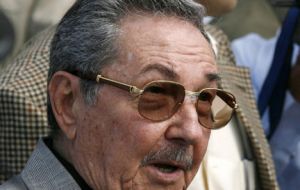MercoPress. South Atlantic News Agency
Havana launches debate on neo-capitalism and “the future of the Cuban Nation”
 How to combat inefficiency by President Raul Castro
How to combat inefficiency by President Raul Castro Cuba began this week a public debate over landmark plans to lift the island's struggling economy and “preserve the revolution’s victories” by liberalizing some private enterprise, admitting small farmers private property, streamlining the vast state bureaucracy by leaving redundant a half-million workers.
The sweeping neo-capitalist changes, which also would end the country's unusual dual-currency system and create new ways to buy and sell private property, were announced earlier this year and outlined in a 32-page document circulated among party leaders ahead of an all-important Communist Party Congress scheduled for April -- the first since 1997.
From December until the end of February, Cuban citizens are encouraged to weigh in on the proposals through party organizations, union meetings and neighborhood and workplace gatherings nationwide, according to an editorial published Wednesday in the state newspaper Granma.
“Nobody should remain with an unexpressed opinion, much less be prevented from expressing it,” the editorial read. “The Party demands the maximum transparency from all its organizations, the greatest clarity in analysis, the clarification of all doubts and anxieties we may have within the bosom of the Revolution.”
“At stake is the future of the Cuban nation,” Granma said.
Although the Communist Party is the only political party allowed in Cuba, officials point to street-level forums held to discuss issues and nominate candidates for local office as evidence that the nation is more democratic than most.
It was not clear how much input ordinary people will actually have on the shape of the economic reforms, since many of them have already been announced and the document released last month was extremely detailed.
Nevertheless the Granma article said all Cubans will have “the opportunity to present their judgment, without hindrance, disagreeing if that's what they think.”
Cuba traditionally holds a Party Congress every five years to announce major policy changes, but the sixth has been delayed repeatedly as the country underwent a change in leadership and grappled with a serious financial crisis.
The document that circulated last month gave a merciless assessment of the current economic situation, saying the country suffers from “inefficiency,” a “lack of capacity in both production and infrastructure” and an aging population.
Cuba also owes billions of dollars to foreign companies that have done business with the island, many of them in Europe. Still, the document stressed that there will be no change in Cuba's one-party, socialist political system.




Top Comments
Disclaimer & comment rules-

-

Read all commentsR.I.P CUBA !!!
Dec 03rd, 2010 - 02:39 pm 0I was right when I said so before....!!!!
With the collapse of the Soviet Union came the “end of history” (Fukuyama 1992). It has been claimed that this left liberal democracy as the only form of legitimate goverment available. Clearly, this may not be the case, but what it did mean is that free market capitalism was the only viable economic model to lift the mass out of poverty. If you have people in charge that know what they are doing!
Dec 03rd, 2010 - 07:46 pm 0Good luck Cuba. At last the old remaining commie nations are seeing that Marxism is best studied in books and is not the basis for sound economics or government.
Commenting for this story is now closed.
If you have a Facebook account, become a fan and comment on our Facebook Page!